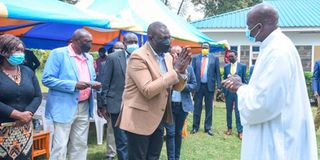Ban on politics in church is a big dilemma

Deputy President William Ruto exchanges greetings with Father Cleopas Osero after a Holy Mass at St. Augustine Catholic Church, Bahati, Nakuru County on August 29, 2021.
When the Anglican Church of Kenya archbishop, Rev Dr Jackson ole Sapit, banned politicians from the pulpit, it may have taken them by surprise: They have always assumed that the Church must accord them the privilege.
To most Kenyan churches, politicians are a bait for their financial support in this era of self-reliance as former mission benefactors abroad no longer support church projects and programmes. And politicians have, no doubt, been allowed to be shapers and formatters of conscience and morals, a duty that has always been specific to the Church.
The question of if politicians should speak in church is controversial but not new. When asked by his opponents about payment of taxes, Jesus Christ cleverly answered: “Give to Caesar what belongs to Caesar and to God what belongs to God.” That was meant to test him on whether he was against the Roman government, hence be branded a dissident, or, if he answered in the affirmative, going against the Mosaic laws, which prohibited idol worship.
Religion and politics are forces that emerged as a response to fundamental human needs: The former to the question of panic on annihilation of life and the latter on temporal governance.
In the Fourth Century, Church and State ceased to be at loggerheads after Roman Emperor Constantine converted to Christianity, making it the state religion, hence the shift from the church of the peasants to that of the rich, leaders and the higher class. Popes had the responsibility of installing emperors.
Voice of the voiceless
In the 1990s Kenya, the Church played a significant role as the voice of the voiceless. The politicians were against the clergy’s involvement in politics. Now it’s the Church telling politicians not to make the Church a platform for political fortunes.
The age-old benefactor left the priest without the skills to source and manage financial resources for pastoral needs; hence, the politicians have taken advantage of the situation by filling the gap since they have the power and control of the economy.
The question calls for proper guidelines. The spirit of harambee established by President Jomo Kenyatta at Independence has become an economic blueprint entrenched in society and the most suitable guest of honour is the politician.
But harambee is a double-edged sword: With the Church a divine and also human institution, it needs temporal goods; but the politician needs the harambee to garner political mileage. The Church must weigh the political mood to make a decision but guard against being compromised by politicians to the extent of abdicating its inalienable social justice role.
As Martin Luther King pointed out, “The Church must be reminded that it is not the master or the servant of the State but rather the conscience of the State. It must be the guide and the critic of the State, and never its tool. If the Church does not recapture its prophetic zeal, it will become an irrelevant social club without moral or spiritual authority.”





